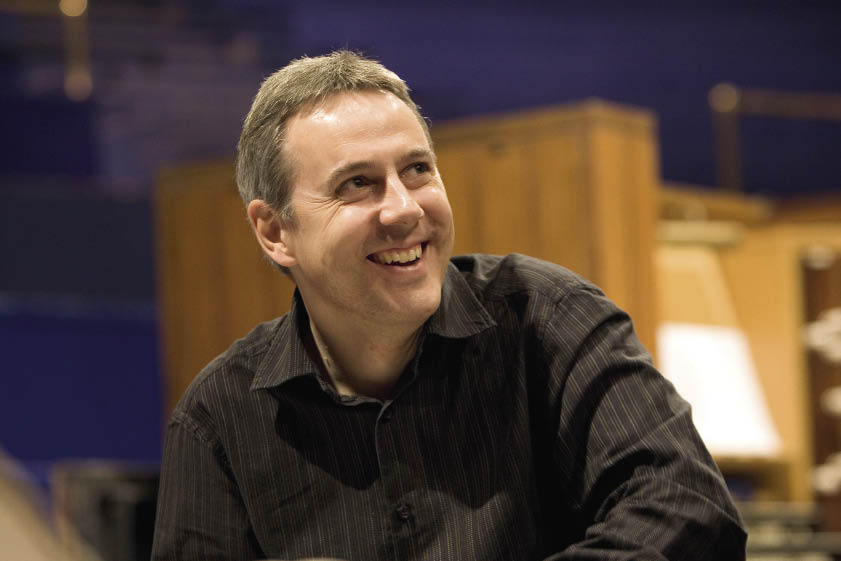Anniversary-consciousness is no doubt primarily commercially driven, certainly in the music world, where the fact that a scarcely remembered composer has been dead for exactly 300 years is a reason for featuring him as This Week’s Composer on Radio Three, but more importantly for many record companies to persuade us that it is time to revalue his contribution to the Orpheus myth, the first to have a bass hero, etc., etc.
Anniversary-consciousness is no doubt primarily commercially driven, certainly in the music world, where the fact that a scarcely remembered composer has been dead for exactly 300 years is a reason for featuring him as This Week’s Composer on Radio Three, but more importantly for many record companies to persuade us that it is time to revalue his contribution to the Orpheus myth, the first to have a bass hero, etc., etc. Last year was a chance, less gratefully taken by some than others, to listen to every dramatic work by Handel, and enormous proportions of the output of Haydn, Purcell, Mendelssohn. Whether this made much difference to anyone’s view of these composers is not easily answerable, though it may have done something to dent the exorbitant claims of Handelians about their hero’s incapacity for writing anything except masterpieces.
Though not widely advertised yet, 2013 will be the bicentenary of Wagner’s and Verdi’s births, and the centenary of Britten’s. Since the first two are great solely on account of their operas, and the last is clearly more important as an operatic composer than anything else, the opera houses of the world are going to have their work cut out. It’s hard to know whether to be excited or filled with dread at the prospect. Leaving Britten to one side, only on the grounds that his operas are not difficult to stage or cast, we will inevitably be faced with vast cycles of the two 19th-century giants’ works, about which the operatic directors are presumably already salivating.
It is inconceivable that between now and then a new generation of singers and conductors will arise and, even if they did, they — singers and conductors — seem to be, as I have often complained, only too willing to go along with the idiotic perversities of productions, when all they need to do, so far as I can see, is to point out to directors that what they are proposing violates the text, the music, and very often the action of the opera which they are supposed to be serving. And it is in Wagner’s case that the problems will be most acute. Though we have seen a fair number of bizarre or ‘deconstructive’ productions of Verdi, there have been very few, if any, to rival the kind of thing that you will see at Bayreuth these days, where only someone extremely familiar with the works before they went to them there would have the least idea of what was going on. For an assortment of reasons, but above all a set of cultural-political ones, Wagner productions now, especially if they emanate from Germany, are most frequently attempts to come to terms with the history of Wagnerism since his lifetime. How much longer those explorations can continue without themselves becoming a wearisome ‘tradition’ is a question directors are going to have to ask themselves soon, even before 2013.
Which is one of the reasons why I was so delighted to hear that Opera North is planning a complete cycle of the Ring, beginning in 2011, one drama introduced each year: its first ever, to be performed in Leeds Town Hall and then in several concert venues, and in concert form. The audiences will be free to do their own interpreting and, if they choose not to, that will hardly be different from what happens anyway after a ‘controversial’ new reading of the Ring in opera houses at present: some people emerge outraged, others allegedly ‘stimulated’, but how many actually think about the work harder and differently as a result?
The Opera North Ring will bring forward, where possible, young singers, and the choice of them will be to a large extent in the hands of Sir John Tomlinson, a Wagnerian with more experience than virtually anyone else alive. He will be working closely with Richard Farnes, who is the musical director of Opera North, and who will be conducting the cycle. He is a conductor whom I have admired intensely, though not in Wagner, since he hasn’t yet conducted a complete work. But his Simon Boccanegra at the Royal Opera in 2003, his Otello at Glyndebourne in 2001, Don Carlos in Leeds last year, Peter Grimes and La bohème, also in Leeds and on tour, have shown a major conductor — but one who has few of the characteristics of a star conductor. After a musically impeccable education at King’s Choir School, Eton and King’s, where he was Organ Scholar, he worked his way round in an old-fashioned way, as repetiteur and choral conductor, and his extremely acute ear, together with his fine sense for balance in very different buildings, and above all, for me, his natural sense of orchestral flow, meant that whatever he has conducted he has made his mark. Salome, performed in concert when the Grand Theatre was being refurbished, gave conclusive evidence of his ability to handle a huge orchestra and bring out telling detail, building up to some of the most stunning climaxes I have ever been present at — and all with due consideration for the voices. Whichever other Ring cycles you go to, Opera North’s will, I’m sure, offer rich musical and dramatic rewards.






Comments